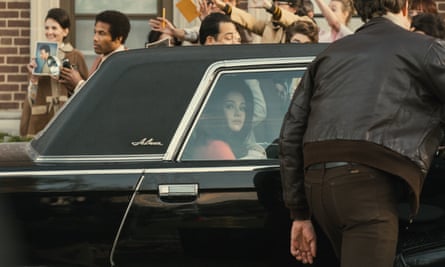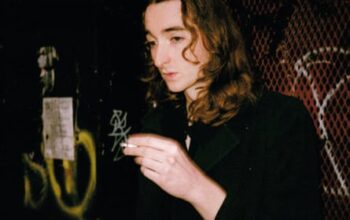P
Pricilla is the focus of Sofia Coppola’s latest film, which follows the story of Elvis Presley’s ex-wife. The movie presents Pricilla as she appears throughout most of the story: surrounded by others but disconnected from them mentally. Her thoughts, emotions, and complexities are hidden from those around her. At just 14 years old, she sits alone at a cafe on an army base in West Germany, focused on her schoolwork and seemingly innocent.
Coppola’s direction maintains a quick pace; the character of Priscilla, portrayed captivatingly by Cailee Spaeny, is suddenly swept into a teenage daydream that appears almost too perfect to be real. This will likely prompt viewers to fact-check on Wikipedia to verify the remarkable details. Priscilla is invited to a party by one of Elvis’s acquaintances; the 24-year-old singer is taken with her, dressed up in the attire of a high school freshman; he requests some time alone with her.
The movie has a wistful tone, with visually stunning scenes and attention to detail, while also being realistic about the origins of the relationship between two people with a significant age gap. Their early interactions, including innocent displays of affection and desperate declarations of their dependence on each other, have a eerie quality like something out of a horror film. Jacob Elordi’s portrayal of Elvis is adequate, but not the main focus of the movie. He is primarily drawn to Priscilla’s delicate and vulnerable demeanor. She appears childlike, with wide-eyed innocence and a strong sense of loneliness, almost like a carefully constructed image. He affectionately calls her “little one”.
Coppola’s choice to focus on Priscilla Presley, a former American schoolgirl who became a famous wife, highlights Elvis’s perspective of her. As a director with her own cinematic legacy, Coppola has created a collection of works centered around the theme of solitary girlhood, with its imagery, isolation, and conflicting ideas of authority. Priscilla, like many of Coppola’s other characters in films such as The Virgin Suicides, Lost in Translation, and Marie Antoinette, is portrayed as an innocent and naive young woman. She learns the value of youth, beauty, and purity, and experiences the delicate dance of male desire. However, she also keeps her true thoughts to herself and gains power in secrecy, only to realize the limitations of that power. Similar to Marie Antoinette, Priscilla is married to a powerful figure and surrounded by opulence, yet she still feels alone and disconnected on a deeper level.
Initially, Coppola’s movie appears to explore the idea of a woman who is often overlooked in her own story. The trailer promised to reveal the woman behind the title of “wife to the King” and “icon to the world.” Young Priscilla has clear desires, such as wanting to see Elvis despite her parents’ disapproval, and more abstract wants, like a desire for physical touch. The film emphasizes the couple’s complicated relationship with sex, with Elvis withholding it and seemingly wanting to maintain Priscilla’s purity. When she is taken to Graceland again, she becomes frustrated and bored in the lavish but eerie surroundings. We see her isolated, sitting alone on the couch with her puppy or separated from fans by a gate. We also get a glimpse of her feeling of disorientation. By day, she is a Catholic schoolgirl, but by night, she plays the role of a flirt, subject to Elvis’s unpredictable moods fueled by substances.
The main focus of impressionistic biopics, a subgenre led by Pablo Larraín, is to capture the emotions that a character experienced at a specific moment in time. These films deviate from traditional storytelling methods in order to depict the essence of an iconic individual’s life rather than focusing on just the factual details. The goal is to create a sensory experience that goes beyond mere recreation, such as the heart-wrenching loneliness and hallucinations of Princess Diana in Spencer, or the shock of Jackie Kennedy as she washes her husband’s blood away in the shower.
Priscilla is heavily involved in this project; it is not so much a biopic as it is a personal account, with input from the real Priscilla and based on her book Elvis and Me from 1985. The film does not simply retell her life story, but rather captures the essence of what it was like to be with Elvis. This is why Coppola does not focus on providing background information on Elvis’s life, such as his military service in Germany or his career and music. Additionally, Colonel Tom Parker, Elvis’s controlling manager played by Tom Hanks in Baz Luhrmann’s Elvis, does not make an appearance. Coppola effectively portrays how Priscilla saw Elvis: as a solitary figure, at times a fickle giver of praise, and at other times a threatening presence, an infantilized caregiver, and a larger-than-life symbol in a small package.

It is unfortunate that we do not get a strong sense of Priscilla’s character. After her arrival at Graceland, the film becomes a series of vignettes and montages, prioritizing the recreation of iconic images and aesthetic over the development of Priscilla’s inner self as a woman. The delicate and intriguing exploration of the possibility of sex ultimately leads to nothing – Elvis takes photos of Priscilla in lingerie, they get married and lie down in bed, cut to honeymoon, cut to pregnancy, cut to leaving the hospital with Lisa Marie. What were her thoughts and emotions during these events? Did she experience pain, fear, joy, relief, or boredom? The Polaroids of a young woman posing for her king are visually stunning, but given their relationship, they only suggest the bare minimum.
Emotions, that elusive and indefinable force, are undoubtedly crucial in an impressionistic depiction, but they alone do not define a person. Even though memories can be vague and uncertain, they are still supported by facts, events, and people. It is likely that Priscilla had strong emotions about significant events in her life such as her first time with Elvis, giving birth, being a young mother, experimenting with LSD, moving to Los Angeles, making genuine friends (Who? How? What brought them together?), having an affair (hinted at but not shown), and witnessing her husband’s visible decline (also barely depicted, which is acceptable). However, the film primarily focuses on the more cinematic elements of success and triumph (spoilers ahead): Priscilla crying as she declares her hard-fought (yet not fully earned on-screen) independence to her soon-to-be ex-husband, and then leaving Graceland alone, accompanied by Dolly Parton’s music.
Unfortunately, in this captivating yet frustrating film, Priscilla appears as a projection of her past self, with a transparent beauty and an unclear sense of self. Despite this, she was not a shy or unremarkable person. Growth occurs for her, but she remains a mystery.
Source: theguardian.com


